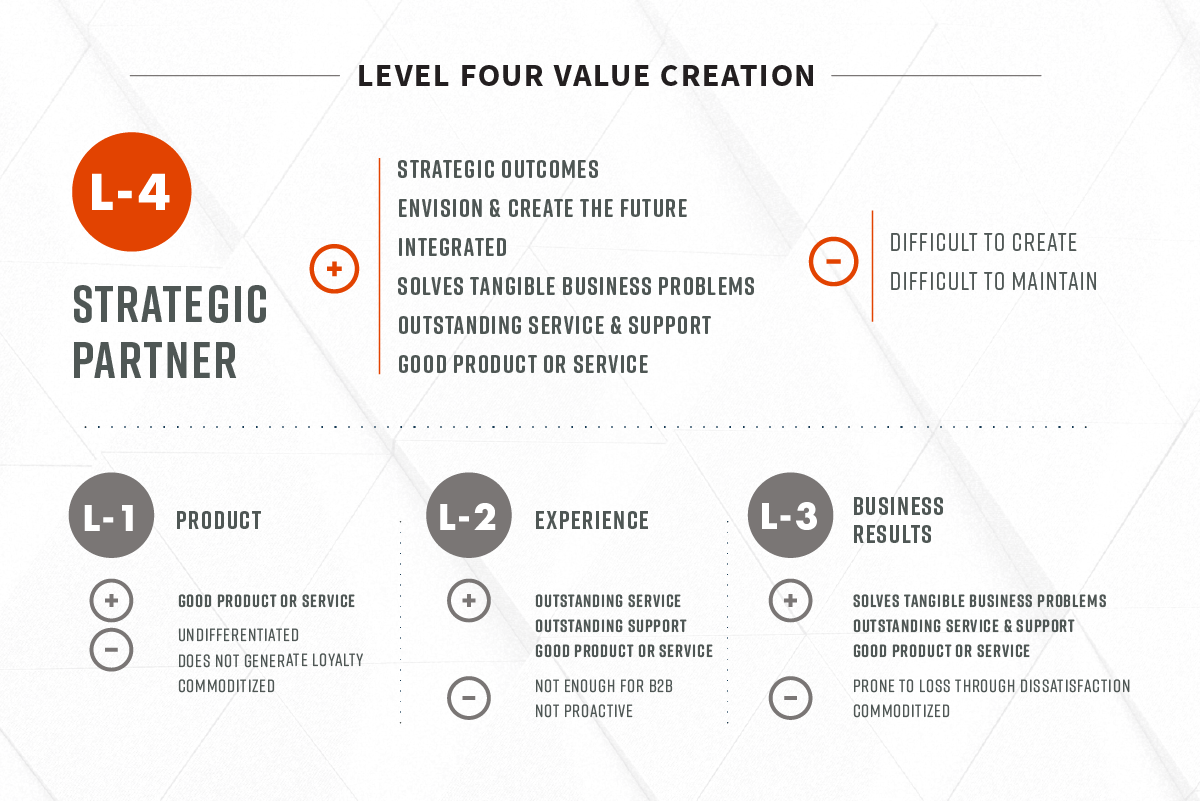Customer loyalty is critical for growth companies. B2B sales organizations that lose clients (churn) must recover lost revenues before they can increase their net new revenue. Losing clients often causes sales organizations to miss their targets and fail to achieve their goals. Looking beyond the numbers, customer loyalty extends beyond simply retaining existing customers or clients. The word loyalty implies a strong relationship where the customer buys from you instead of a competitor.
My decades of experience in sales and sales leadership were in an industry where winning a client meant displacing my competitors. Sometimes, the game was to take your competitor's most valuable customers away. Once I won their client, it was crucial to continue to create value, which helped me keep clients for decades.
In this article, we'll discuss how to improve customer loyalty in B2B sales, understand your clients, expect the need to provide customer service, and build relationships. To do this, you first need to understand your customers.
Understanding your customers stretches beyond customer satisfaction. We'll focus on an improved version of customer engagement based on value creation. To be able to provide that, you need to complete the following steps.
Identify Your Target Audience
Targeting and pursuing the right prospective clients is the starting point for customer retention. You want to identify companies that care deeply about what you do and how you do it. For example, if you call on a client that would benefit from the value you can create for them, but they're the lowest-priced provider in their industry, they may not be willing to pay more for results.
It's imperative to identify the right companies to start the sales process with—ones that are large enough but also the right fit for you and your company.
Understand Your Prospective Client's Pain Points and Needs
Value creation requires that you know your prospective clients' problems, pain points, and needs before you meet with them. A salesperson using a traditional sales approach may believe they need to ask the client about their problems and pain points. However, this can often cause the client to question the salesperson's expertise and authority in their industry.
Salespeople with business acumen and a deep understanding of their B2B buyers' pain points have a greater chance of winning the client's business long-term. A B2B customer loyalty program is centered on value creation.
Gather Feedback and Implement Improvements
If you have clients, you also have problems. You have your own problems and the ones your company creates for your clients. Depending on the size and complexity of your clients, you may need to gather feedback more often than for other clients.
Some clients may only require a customer interaction every quarter if things are going well, but it's always worthwhile to conduct a quarterly business review (QBR). Adjusting your program is key to retaining your B2B clients, and always aim to resolve their concerns.
Providing Exceptional Customer Service
Providing exceptional customer service doesn't always create loyal customers in the new B2B sales environment, but it's still worthwhile to do so. You must also create new value.
Setting Clear Expectations and Delivering on Them
Failing to deliver on expectations causes B2B salespeople and organizations to lose their clients. It's not enough to sell your clients whatever you offer at any price. Instead, you must help them with a level of service that meets their needs and set clear expectations you can deliver on.
Your clients need Level 4 Value (strategic outcomes) to remain loyal to you. It is crucial that, at the beginning of the relationship, you establish that you will create new value.

Personalizing the Customer Experience
Different stakeholders need different values from you and your company. End-users need your products or services to work for them, while ancillary stakeholders like IT and accounting expect you to be easy to do business with. Managers rely on you to execute flawlessly, and senior leaders depend on you to ensure strategic outcomes. Addressing all of their needs is how you can personalize the customer experience.
Building Strong Relationships
All things being equal, relationships win. Even when things are unequal, relationships still win. This is why your clients don't defect when your competitors offer them a better price. Relationships are a soft skill in sales, and no matter what you hear, they improve results. They allow you to sell in a way that removes the need to compete for your client's business.
Developing Rapport with Customers
The personal rapport you build with your clients must be matched with business rapport in B2B sales. As much as you and your client like each other, if you can't create increased value over time, the lack of business rapport can provide an opportunity for a savvy salesperson to steal your client.
Maintaining Regular Communication
Relationships require time, effort, and value creation. This is an investment you make in retaining clients. You need a cadence that allows you to communicate regularly so you can deepen your relationships, identify upcoming needs, and find new ways to improve your clients' results. Long periods without communication threaten your relationship and your clients' loyalty.
Offering Value Beyond the Transaction
Value beyond the transaction means taking it above and beyond to create value for your clients. Updating your clients on trends in your industry or theirs, or something that may benefit them, is an excellent way to provide additional value.
When you win a large client, it's crucial to keep them. Sales organizations often struggle when they win their dream clients only to lose them later. This can hinder the growth of net new revenue. The most effective strategies for winning and retaining your clients involve creating new value. Salespeople who become apathetic and stop creating value for their clients risk losing them to a value creator.
Building strong relationships and consistently creating value for your existing clients is essential to retaining them. If you need more help, you can find it here.










.jpg?width=768&height=994&name=salescall-planner-ebook-v3-1-cover%20(1).jpg)


